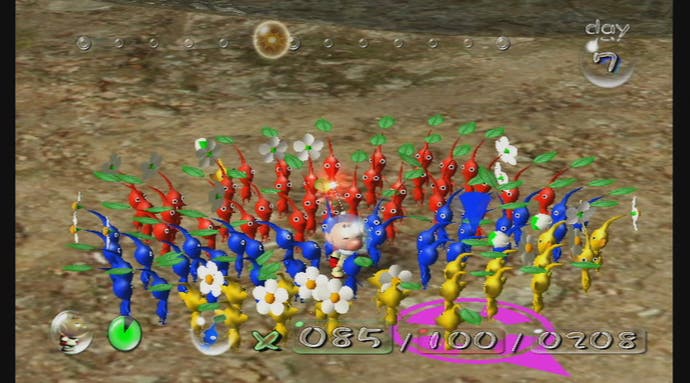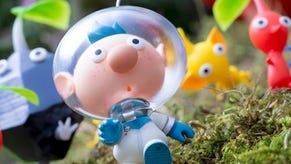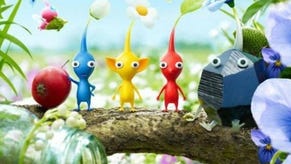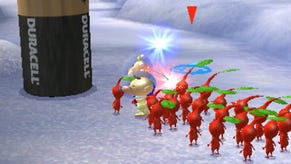New Play Control! Pikmin
Old Game Still Good!
Nintendo's New Play Control! series will reissue some of the company's GameCube games for the Wii with tweaks to the game design here and there, and controls re-engineered to take advantage of the Wii remote. They're neither straight re-releases nor complete remakes, and they might seem a curious move when you consider that any of the originals can be picked up on the cheap and played on the backwards-compatible Wii if you have a GameCube controller.
You can justifiably call them a cynical attempt to plug the machine's release schedule with high-margin filler. You can just as easily rejoice at the restoration of some terrific (and actually, not so easy to find) games from an overlooked but very creative period in the history of one of the world's great videogame makers. Or you might welcome the introduction of those games to a huge new audience that missed them first time around - an audience that isn't interested in digging around in bargain bins, or manipulating strange purple controllers. At least, unlike last year's Wii version of Animal Crossing, they're honestly presented as embellished ports rather than new releases.
New Play Control! is just business, of course, but it's business that bridges the increasingly painful gap between Nintendo's specialised past and everyman present, and goes some way towards rounding out the selection of games on the Wii shelves in the shop. In reviewing these reissues, we're going to judge their quality against new Wii releases, see how they stand up today, and how they've been changed - for better or worse.
First up is Pikmin, Shigeru Miyamoto's surreal gardening-strategy-adventure from 2001 - a very early GameCube release. Nintendo fans at the time were baffled and heartbroken by their guru's seeming disinterest in a substantial new Mario or Zelda in favour of small-scale experiments like Pikmin and Luigi's Mansion. Over seven years on, with Super Mario Galaxy and Zelda: Twilight Princess relatively fresh in the memory, it's easier to appreciate these games for what they are, rather than what they aren't.
And Pikmin is, in its bizarre way, still the most successful realisation of multi-tasking, real-time strategy gameplay there has ever been on a console. Players take control of Captain Olimar, an inch-high spaceman stranded like Gulliver on a strange planet that looks oddly like an unkempt back yard, only populated with the strangest creatures imaginable: lumbering, strawberry-bodied Bulborbs; translucent fire-breathing Blowhogs; ethereal, floating Honeywisps. And Pikmin.

Pikmin turn out to be a willing army of minuscule, colour-coded, flower-topped plant-men who live in onion-shaped helicopter tripods. Olimar can grow them, pluck them from the ground, throw them about, and command up to one hundred of them at a time to do his bidding: combat with other creatures, harvesting of materials, construction and demolition work - and most importantly, salvage. He needs their help to fetch and carry 25 missing parts of his spaceship in thirty "days" (about 15 minutes each) before his air supply runs out.
The point-and-click (or rather, point-and-throw) interface for assigning Pikmin to tasks makes the game an obvious candidate for a Wii makeover. The cursor is now directed just by pointing the Wii remote - in the GameCube version, both cursor and Olimar's movement were combined on the stick. Naturally, use of the pointer is extremely fast and intuitive. The remainder of the controls - dismiss and divide Pikmin, summon with whistle, throw, cycle between types - are roughly similar.
The only exception is direct command of your squad, who in the GameCube version could be moved around with the C-stick to keep them out of harm's way, or push them into nearby tasks. This is now accomplished by holding down on the d-pad and directing with the pointer. If anything, it's slightly more cumbersome than it was before, but then again the ease of pointer control means you'll be using it less.





